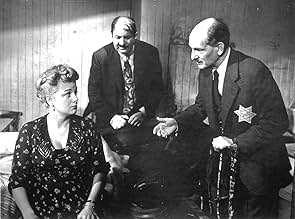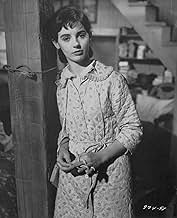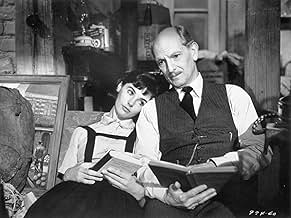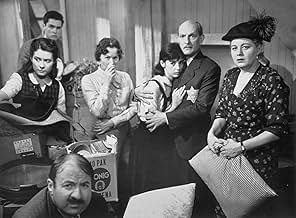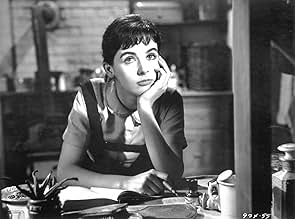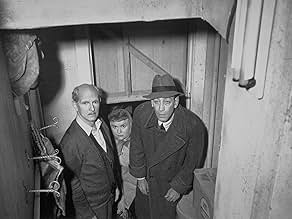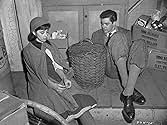During World War II, a teenage Jewish girl named Anne Frank and her family are forced into hiding in the Nazi-occupied Netherlands.During World War II, a teenage Jewish girl named Anne Frank and her family are forced into hiding in the Nazi-occupied Netherlands.During World War II, a teenage Jewish girl named Anne Frank and her family are forced into hiding in the Nazi-occupied Netherlands.
- Won 3 Oscars
- 9 wins & 14 nominations total
Dodie Heath
- Miep Gies
- (as Dody Heath)
Arthur Berkeley
- Dutch Workman
- (uncredited)
Robert Boon
- SS Man
- (uncredited)
John Corrydon
- Dutch Workman
- (uncredited)
Del Erickson
- SS Man
- (uncredited)
Gretchen Goertz
- Sanne Devries
- (uncredited)
William Kirschner
- Workman in Shop
- (uncredited)
Edmund Purdom
- British Radio Announcer
- (voice)
- (uncredited)
Featured reviews
We had to watch this movie in Drama class my freshman year of high school. Problem was that I had Drama 1st period. I slept a lot 1st period (and sometimes 2nd). So a 3 hour movie that the teacher taped (with commercials) was turned in to a two week affair, or so it seemed. I got another shot to watch it late one night, 4 am or so, on Bravo. Problem was, unbeknownst to me, it was a two night deal. So I only took in the first half of it. Finally got the shot to see the whole thing on AMC this afternoon. Millie Perkins was just wonderful as Anne Frank, and a great cast all around. I knew Shelley Winters had won an Oscar but not what for. Sometimes a good story is so much better because it's a true story, like Apollo 13, and this is no exception. It's hard to imagine these things actually happened.
Go watch this sometime when you have 3 hours free.
8 out of 10 from me.
Go watch this sometime when you have 3 hours free.
8 out of 10 from me.
I had read the book as a child and was swept up in the depiction of lives lived hidden away in the attic of a factory in Amsterdam, the strong true voice of Anne in her diaries capturing a world of imprisonment, the only crime being that of the wrong religion. Anne's spirit is never quenched as she experiences all the trial and tribulations of burgeoning adolescence, difficulty with her mother and a slow falling in love with a teenage boy, Peter, who shares her quarters.
The book was made into a successful play and then transfered to the screen where it was shortened considerably from the original. And that is where I saw it first, on the screen, but the shorter version, not being aware of the original length.
The cast are amazing, particularly Millie Perkins, who was the least experienced of all the cast and has to be in almost every scene. She candidly shared her experience of the six months' filming when the cast was virtually in captivity and mentioned in passing that the most difficult time she had was not surprisingly with the director, George Stevens, who was extremely supportive but rather with Joseph Schildkraut, who plays Otto Frank, her father in it. He made her life hell on set and never let her forget she was totally inexperienced, unlike the rest of them, in the way of acting. I'm mentioning this as not an inkling of this tension comes across on screen, and Millie has to share a lot of loving scenes with Joseph. Only a gifted actress could overcome her distaste for the man and perform as she did.
The expanded version of the movie is remarkable. It engenders a claustrophobic feeling in the viewer and an overwhelming sadness, knowing that none of these characters, apart from Otto, will survive the madness of the camps.
Anne's positive spirit drenches every scene, she believes in the intrinsic goodness of everyone in spite of everything.
Shelley, as Peter's mother, deserved her Oscar, she conveys her unhappy marriage, her reliance on the material, her love for her son, so well. Diane Baker, as Margot, Anne's sister, hands in a great performance as does the above mentioned Joseph. Ed Wynn, breaking type, plays Dussell the dentist as an irritating busybody.
In the way of the Oscars, so many superb movies fail to attain the best picture of the year. This is one of them. That year, the best picture Oscar went to Ben Hur. This is a far superior movie.
9 out of 10. Superb, especially in the restored length. Not to be missed. B&W at its finest.
The book was made into a successful play and then transfered to the screen where it was shortened considerably from the original. And that is where I saw it first, on the screen, but the shorter version, not being aware of the original length.
The cast are amazing, particularly Millie Perkins, who was the least experienced of all the cast and has to be in almost every scene. She candidly shared her experience of the six months' filming when the cast was virtually in captivity and mentioned in passing that the most difficult time she had was not surprisingly with the director, George Stevens, who was extremely supportive but rather with Joseph Schildkraut, who plays Otto Frank, her father in it. He made her life hell on set and never let her forget she was totally inexperienced, unlike the rest of them, in the way of acting. I'm mentioning this as not an inkling of this tension comes across on screen, and Millie has to share a lot of loving scenes with Joseph. Only a gifted actress could overcome her distaste for the man and perform as she did.
The expanded version of the movie is remarkable. It engenders a claustrophobic feeling in the viewer and an overwhelming sadness, knowing that none of these characters, apart from Otto, will survive the madness of the camps.
Anne's positive spirit drenches every scene, she believes in the intrinsic goodness of everyone in spite of everything.
Shelley, as Peter's mother, deserved her Oscar, she conveys her unhappy marriage, her reliance on the material, her love for her son, so well. Diane Baker, as Margot, Anne's sister, hands in a great performance as does the above mentioned Joseph. Ed Wynn, breaking type, plays Dussell the dentist as an irritating busybody.
In the way of the Oscars, so many superb movies fail to attain the best picture of the year. This is one of them. That year, the best picture Oscar went to Ben Hur. This is a far superior movie.
9 out of 10. Superb, especially in the restored length. Not to be missed. B&W at its finest.
The film The Diary of Anne Frank is not taken directly from her world famous diary, but it is rather an adaption of a play based on that diary. The play was written by Frances Goodrich and Albert Hackett and it ran on Broadway from 1955 to 1957 for 717 performances.
Three members of the original Broadway cast did their roles for the screen, Joseph Schildkraut, Lou Jacobi, and Gusti Huber. Joseph Schildkraut as Otto Frank is the backbone of the film, providing the moral authority in the cast. He's a teacher and a scholar and makes sure that even under these circumstances, the education of his daughters is not neglected. Gusti Huber is Mrs. Frank and Lou Jacobi is Mr. Van Daan.
The Van Daans and the Franks have been offered shelter in a third floor apartment that is kept secret by a hidden door in a factory owner. The owner Mr. Kraler played by Douglas Spencer is an anti-Nazi and has offered to keep these two Jewish families hidden for the duration of the war in Holland. For two years they live in that apartment and aside from radio news all they know of the outside world is that street in Amsterdam where the factory is located. Director George Stevens to keep the viewer from getting claustrophobic provides us with occasional shots of the outside street and canal. This film is the ultimate in cabin fever.
But it has to be so for the Van Daans and the Franks are hiding for their lives. It's a community of necessity that's created up in the third floor.
Young Millie Perkins does fine in the title role originated on Broadway by Susan Strassberg. She has an Audrey Hepburn like appeal, but never had the career Audrey certainly did. Her sister Margit is played by Diane Baker who's career was a bit more substantial. Two very normal average teenage girls, except that Anne has a talent for writing and observing.
The frightening thing about this film is the very ordinariness of the characters. What have these people ever done that the might of the Nazi war machine should be out looking for them? Some of them are certainly not noble specimens as the movie shows, but their lives are so humdrum like millions of us. Simply because for politics sake, someone was scapegoating a religion.
Ed Wynn as Drussel the dentist and Shelley Winters as Mrs. Van Daan were nominated for supporting players in the male and female categories that year. Wynn lost, but Winters won the first of her two Oscars for this film. Up to then Ms. Winters played some pretty brassy characters in film. She fought for and won this role and got acclaim worldwide for her portrayal as a wife and mother. It was a transition into those kind of roles for her.
So Anne observed and wrote about her impressions of what she saw and heard and the people around her for two years. In a sense this is like Moby Dick with the Pequod being the apartment and the white whale being the Nazis. Joseph Schildkraut is no Ahab, he's just trying to lead his community for survival.
When the Nazis come, Anne's diary is hidden and after the war one of the community comes back and like Ishmael retrieves the diary and very much tells the tale.
Anne's diary, the hopes and dreams of a teenage girl caught up in a world of hate she couldn't comprehend, is now classic literature. It serves as a dark reminder of the bestial nature we can sink to. And it reminds us that hope, courage and love can spring from the darkest places.
Three members of the original Broadway cast did their roles for the screen, Joseph Schildkraut, Lou Jacobi, and Gusti Huber. Joseph Schildkraut as Otto Frank is the backbone of the film, providing the moral authority in the cast. He's a teacher and a scholar and makes sure that even under these circumstances, the education of his daughters is not neglected. Gusti Huber is Mrs. Frank and Lou Jacobi is Mr. Van Daan.
The Van Daans and the Franks have been offered shelter in a third floor apartment that is kept secret by a hidden door in a factory owner. The owner Mr. Kraler played by Douglas Spencer is an anti-Nazi and has offered to keep these two Jewish families hidden for the duration of the war in Holland. For two years they live in that apartment and aside from radio news all they know of the outside world is that street in Amsterdam where the factory is located. Director George Stevens to keep the viewer from getting claustrophobic provides us with occasional shots of the outside street and canal. This film is the ultimate in cabin fever.
But it has to be so for the Van Daans and the Franks are hiding for their lives. It's a community of necessity that's created up in the third floor.
Young Millie Perkins does fine in the title role originated on Broadway by Susan Strassberg. She has an Audrey Hepburn like appeal, but never had the career Audrey certainly did. Her sister Margit is played by Diane Baker who's career was a bit more substantial. Two very normal average teenage girls, except that Anne has a talent for writing and observing.
The frightening thing about this film is the very ordinariness of the characters. What have these people ever done that the might of the Nazi war machine should be out looking for them? Some of them are certainly not noble specimens as the movie shows, but their lives are so humdrum like millions of us. Simply because for politics sake, someone was scapegoating a religion.
Ed Wynn as Drussel the dentist and Shelley Winters as Mrs. Van Daan were nominated for supporting players in the male and female categories that year. Wynn lost, but Winters won the first of her two Oscars for this film. Up to then Ms. Winters played some pretty brassy characters in film. She fought for and won this role and got acclaim worldwide for her portrayal as a wife and mother. It was a transition into those kind of roles for her.
So Anne observed and wrote about her impressions of what she saw and heard and the people around her for two years. In a sense this is like Moby Dick with the Pequod being the apartment and the white whale being the Nazis. Joseph Schildkraut is no Ahab, he's just trying to lead his community for survival.
When the Nazis come, Anne's diary is hidden and after the war one of the community comes back and like Ishmael retrieves the diary and very much tells the tale.
Anne's diary, the hopes and dreams of a teenage girl caught up in a world of hate she couldn't comprehend, is now classic literature. It serves as a dark reminder of the bestial nature we can sink to. And it reminds us that hope, courage and love can spring from the darkest places.
10blue-7
It's a pleasure to report that the long wait for George Stevens' THE DIARY OF ANNE FRANK to come to the DVD format has been worth the wait. The restoration is far better then the fine 1995 Laser Disc issue, which was the only previous release to include the Overture, Intermission and Exit Music for the film as well as the "roadshow", 170 minute version of the film. As Alfred Newman's score is one of his finest, the addition of the extra music is a true treat. Issued as one of Fox's "Studio Classics", the DVD shows that a great deal of tender care has gone into this outstanding release. The complete films is contained on one side. Side two is full of some nice extras, headed by a full-length documentary, "ECHOS FROM THE PAST", that is very informative. There is a nice excerpt from the documentary feature, "GEORGE STEVENS: A FILMMAKER'S JOURNEY", which was produced and directed by George Stevens, Jr. Stevens' son also provides the commentary track along with actress Millie Perkins for the film itself. There are two interesting previews included, one for the U.S. release after the film was taken off the roadshow run (and CUT by almost 20 minutes) and also the International version, which uses Newman's music over the scenes without any dialog from the film itself. Perkins' screen test, newsreel footage a number of excellent behind the scenes photographs and a restoration comparison round out the second side. The film and this DVD are HIGHLY RECOMMENDED.
This worthwhile cinematic tribute to "The Diary of Anne Frank" offers a solid cast, some very effective settings, and a generally well-considered selection of episodes. No mere movie could convey the full force of the original diary, which no one who has read it can forget. But this movie version is good in its own right, and it does add some memorable, if sometimes non-historical, images to the story. The script does alter some details, and it's hard to see why they could not simply have filmed a selection of actual events, since that could have been more than effective enough. But, as a movie in its own right, it works well.
The Diary is most important for its record of the daily lives of real individuals who lived in constant fear because of the Nazis and their irrational persecutions. It puts names and faces on the kind of human disaster that is all too often described in terms of mere numbers. The movie does well in bringing out this aspect of the diary, making the characters come to life in settings that are interesting, detailed, and believable. The photography also makes good use of the settings and the details.
The other significant aspect of the Diary is its portrait of Anne herself. Her writings combine observations on the overall situation with observations about her own life and self, with a surprising degree of perception. This does not come out so much in the movie, though of course this would be much harder to accomplish. Millie Perkins projects a rather different image from the original Anne, but then again, there is nothing really wrong with her performance in itself. She does make a sympathetic and generally believable heroine. The supporting cast generally does a good job. The fine character actor Joseph Schildkraut gives the best performance, as Anne's father Otto.
Overall, if viewed with reasonable expectations and evaluated apart from the book, this adaptation is an interesting and worthwhile movie.
The Diary is most important for its record of the daily lives of real individuals who lived in constant fear because of the Nazis and their irrational persecutions. It puts names and faces on the kind of human disaster that is all too often described in terms of mere numbers. The movie does well in bringing out this aspect of the diary, making the characters come to life in settings that are interesting, detailed, and believable. The photography also makes good use of the settings and the details.
The other significant aspect of the Diary is its portrait of Anne herself. Her writings combine observations on the overall situation with observations about her own life and self, with a surprising degree of perception. This does not come out so much in the movie, though of course this would be much harder to accomplish. Millie Perkins projects a rather different image from the original Anne, but then again, there is nothing really wrong with her performance in itself. She does make a sympathetic and generally believable heroine. The supporting cast generally does a good job. The fine character actor Joseph Schildkraut gives the best performance, as Anne's father Otto.
Overall, if viewed with reasonable expectations and evaluated apart from the book, this adaptation is an interesting and worthwhile movie.
Did you know
- TriviaAudrey Hepburn was first offered the role of Anne Frank, and Otto Frank was among those who nominated her. She refused it for three reasons. Firstly, she had decided to accept the role in Green Mansions (1959). Secondly, she had lived in occupied The Netherlands during the war and had seen the Nazis carry out street executions and watched as they herded Jews onto boxcars to carry them to concentration camps. She knew that making the film would bring back memories that were far too painful for her. However, thirdly, she was 30 and felt that she was too old to play a teenage character convincingly on screen.
- GoofsAnne Frank was given the diary for her thirteenth birthday, a few days before they all went into hiding and not after going into hiding as depicted in the film.
- Quotes
Anne Frank: I know it's terrible trying to have any faith when people are doing such horrible... But you know what I sometimes think? I think the world may be going through a phase, the way I was with mother. It'll pass. Maybe not hundreds of years, but someday. - I still believe, in spite of everything, that people are really good at heart.
- Crazy creditsAt the end, neither a "The End" credit nor a cast list appears, only the title of the film once more ("The Diary of Anne Frank").
- Alternate versionsOriginally released at 170 minutes, then later cut and available only in 156-minutes version. Complete edition has been recently restored on video.
- ConnectionsFeatured in George Stevens: A Filmmaker's Journey (1984)
- SoundtracksBerg op zoom
(uncredited)
Traditional
Details
Box office
- Budget
- $3,800,000 (estimated)
- Runtime
- 3h(180 min)
- Color
- Aspect ratio
- 2.35 : 1
Contribute to this page
Suggest an edit or add missing content


